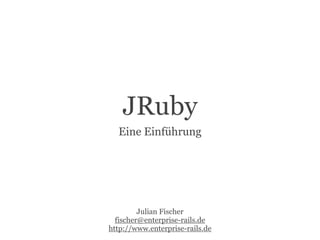Das Dokument bietet eine Einführung in JRuby, einen Ruby-Interpreter, der vollständig auf der JVM läuft und Java-Threads verwendet. Es beschreibt, wie man Java in JRuby integriert, einschließlich der Einbindung von JAR-Dateien und der Verwendung von Java-Klassennamen. Außerdem wird der Deployment-Prozess einer Ruby-Anwendung über Warbler in einen Servlet-Container erläutert.






















![Java in JRuby
‣ Import
‣ java_import java.lang.System
version =
System.getProperties["java.runtime.version"]
@railshoster](https://image.slidesharecdn.com/jruby-120102101722-phpapp01/85/JRuby-23-320.jpg)
![Java in JRuby
‣ Import
‣ java_import java.lang.System
version =
System.getProperties["java.runtime.version"]
‣ import java.lang.System
version =
System.getProperties["java.runtime.version"]
@railshoster](https://image.slidesharecdn.com/jruby-120102101722-phpapp01/85/JRuby-24-320.jpg)
![Java in JRuby
‣ Import
‣ java_import java.lang.System
version =
System.getProperties["java.runtime.version"]
‣ import java.lang.System
version =
System.getProperties["java.runtime.version"]
‣ Sys = java.lang.System
version = Sys.getProperties["java.runtime.version"]
@railshoster](https://image.slidesharecdn.com/jruby-120102101722-phpapp01/85/JRuby-25-320.jpg)





























